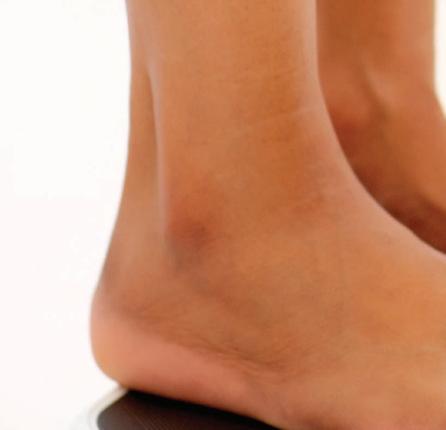Better Health








The numbers tell the story.
By K eith J O ’C onnor Special To The Republican
Nearly 1 in 3 adults are overweight. More than 2 in 5 adults have obesity. And about 1 in 11 adults have severe obesity.
When most people think of obesity, their thoughts usually don’t go much further than the notion of being overweight. But, in truth, there’s a lot more to obesity than the numbers on the scale.
“Obesity is itself a disease that often triggers a number of severe health conditions. Over time, those conditions can become chronic, progressive, debilitating, and potentially life-threatening. For many, the struggle to lose weight is complicated by the challenge of managing those health conditions. Individuals who are unable sustain a healthy weight and are experiencing chronic conditions are often strong candidates for weight loss surgery,” said Dr. John Romanelli, Medical Director of Bariatric Surgery and Chief, Division of General Surgery at Baystate Health.
Factors that may contribute to excess weight gain among adults include genetics; types and amounts of food and drinks consumed; level of physical activity; degree of time spent on sedentary behaviors, such as watching TV, engaging with a computer, or talking and texting on the phone; sleep habits; medical conditions or medicines; and where and how people live, including their access to and ability to afford healthy foods and safe places to be active.
As the New Year begins, thoughts and resolutions often turn to losing weight. Dr. Romanelli answers the following questions for those considering losing weight this year to benefit their health:
Why should you always check with your primary care physician before starting any diet?
Changing your diet could alter how your medications work and you need to be certain that you are in good cardiovascular health before starting a fitness plan.
How can you determine if you truly need to lose weight?

The bottom line is if you think you need to lose weight, you likely do and should discuss it with your primary care physician. Normal BMI is 25 or below. Sadly, most Americans are above this number. BMI is your weight in kilograms divided by height in meters squared. There are many BMI calculators available online to help.
Why is it important to lose weight?
Our body physiology works more effectively when we are the correct weight. Virtually every body system is adversely affected by being overweight. The most obvious systems are cardiovascular – high blood pressure, heart disease – and endocrine – diabetes. But all body systems work less well when you are overweight.
Losing weight safely and at a realistic pace is the best way to reach






your healthy weight and to maintain that loss in the long term.
How much should you lose in a week/month?
It is different for all patients, so this is hard to generalize. But the best weight loss intervention is to do something that is sustainable in the long term. Otherwise, you risk reverting to “normal” eating behaviors/habits, which got you into the need to diet in the first place.
How do you make head or tails among all the advertising promoting various diets in the New Year?
Any significant diet should be discussed with a healthcare profes-
in the physiology of appetite. Zepbound additionally blocks another hormone called Gastrointestinal Peptide (GIP). There is a third drug coming to market in 2024 (not yet trade named) that blocks three hormones and has the best potential yet. These drugs slow the emptying of the stomach, which is desirable because it will take you longer to get hungry. Whether or not this effect (called gastroparesis) is permanent is unknown. I have heard from several patients and colleagues that the effect lasts after stopping the drugs. Both medications seem to cause a lot of nausea; an oral version of one of these drugs has been pulled from clinical trials because it was just too hard to take. Whether or not these
“Weight loss surgery is a tool that can be very helpful when employed the right way and only works well in coordination with calorie burning exercise, substantial behavioral changes, and a firm commitment to eating a better diet.”
sional prior to starting it. Two tenets: if it sounds too good to be true, you are likely correct, and if it sounds like it isn’t good for you, you are also probably correct.
What about the weight loss drugs we are hearing so much about in the media?
There are two new drugs on the market for weight loss: Wegovy (the weight loss form of Ozempic) and Zepbound (the weight loss form of Mounjaro). Wegovy works as an agonist to the hormone GLP-1, which is proving to be a major player
drugs have long term success will depend on whether they are tolerable. Currently, they are injections, and patients must administer them to themselves. I do think the popularity will increase when the cost comes down (currently more than $1,000 per month) and there is a tolerable oral form. These medications are popular because they have shown the most promise.
How can a dietitian help?
Most of us know very little about how to eat correctly, and what we are taught in schools is inaccurate,

(ABOVE
unhelpful, and for those of us in our 40s or older, has been debunked. Dietitians can teach many things about hunger, appetite, and making good food choices. For example, do you read the labels on the food products that you buy? You should, but very few people do so.
When should bariatric surgery be considered?
It should be seriously considered when sustained efforts at dieting and exercise have failed, and a doctor thinks it is the next step for a patient.
Dr. Romanelli is one of two surgeons in the Bariatric Surgery program alongside Dr. Jay Kuhn, who have a total of 37 years combined in their consistent efforts to bring the best in bariatric surgery to western Massachusetts.
“Ours is a comprehensive program that will take patients anywhere from six months to one year to complete. Patients need to know that this is not something that can be done overnight. Weight loss surgery is a tool that can be very helpful when employed the right way and only works well in coordination with calorie burning exercise, substantial behavioral changes, and a firm commitment to eating a better diet,” Dr. Romanelli said.
Weight loss surgery is an option for people who are severely obese (about 100 lbs. over your ideal body weight and a BMI – body mass index - of 35 and above) and cannot lose weight with diet and exercise alone. Improving your lifestyle, eating right, and staying active is still important.
To learn more about Baystate Health’s Bariatric Surgery program, call 413-794-7020 in Springfield or 413-773-2626 in Greenfield.
As
thoughts
D | | SUNDAY, JANUARY 21, 2024
the New Year begins,
and resolutions often turn to Losing Weight
Skywatch: A look back at 2023 and what lies ahead, masslive.com/living SPRINGFIELD
The science of animation, D9 FILM:
discusses
D9 HEALTH:
MUSEUMS:
Tina Fey
‘Mean Girls’ then and now,
When is a cough a concern, D9
Dr. John Romanelli, Medical Director of Bariatric Surgery and Chief, Division of General Surgery at Baystate Health. PHOTO COURTESY OF ISTOCK IMAGES)









Each new day brings the potential for change, even amid the routine of the daily grind. When people start the day with positive thoughts, it can affect how they behave and see themselves throughout the day, and may even benefit their overall health.





Maintain your commitment to exercise positive frame of mind
The Mayo Clinic says some studies suggest personality traits such as optimism and pessimism can affect many areas of a person’s health and well-being. Positive thinking that is pronounced in optimistic people is associated with effective stress management, which translates into many different health benefits.
Some people abide by the “Law of Attraction,” which states that what a person gives attention to and thinks about throughout the day is what will be predominant in their life. Whether this is true or not, many aspire to have more positive thoughts and be in a generally optimistic mindset. The following tips can put people on a positive path at the start of each day.
Begin the night before
Certain mental health experts suggest clearing the mind in the evening to
create the mental capacity to wind down and relax. Keep a notepad handy and jot down any invasive thoughts or concerns. Removing these thoughts from the mind and putting them on paper can help you rest more readily. Being well-rested can improve mood.
Know your weaknesses
Recognize where you may need some help as you strive to be more optimistic. Map out the behaviors you want to change, and then be intentional about how you want your day to go and which actions will get you there. The Mayo Clinic suggests figuring out what you usually think negatively about (i.e., work, commuting, life changes) and then approach each aspect in a more positive way.
Take a technology pause
Do not check email or text messages right after opening your eyes. Similarly, avoid reading the news or watching news programs on television too early. Negative or scandalous stories often get the most clicks or views, and coming across upsetting information
adversely affect your mood. Rather, spend time meditating, praying, reading, or just being in the moment until you are awake.
Recognize the good people are doing
When you open your eyes and focus on the positives, you’ll see all the good that other people are doing around you. Offering compliments or acknowledging others’ actions, whether large or small, puts positivity out there.
Focus on gratitude
Take a few moments at the start of each day to mentally list all the things you are grateful for. This may be that you have a cozy home or that you are healthy. Even stressful situations or people can be means for gratitude. Boisterous toddlers may be a handful, but you can be grateful for the ability to have had children when so many are not able.
Starting the day with a positive mindset is easier than one might think. It may take a little practice, but also can begin to pay positive dividends sooner than later.





At one point or another, millions of adults across the globe have resolved to be more physically active.
The benefits of routine exercise are too numerous to cite, but some of the more notable ones include a lower risk for chronic disease and illness, improved self-esteem and greater overall health.
With so much to gain from routine exercise, it’s no wonder so many people aspire to be more physically active. But it’s easy to lose motivation when aspiring to exercise more. Each year, one of the most popular New Year’s resolutions is to exercise more.
In fact, Statista conducted a survey regarding New Year’s resolutions for 2023 and found that exercising more was the most popular resolution. However, a 2021 study published in the International Journal of Environment Research and Public Health found that 64 percent of people abandon their New Year’s resolutions within a month
of making them. Exercising more requires commitment, and there are some ways to make it a little easier to maintain that commitment over the long haul.
Break it up
The Harvard T.H. Chan School of Public Health notes that people don’t need to exercise all at once to reap the rewards of physical activity. If time is tight, break up a workout over the course of your day. Some strength-training exercises in the morning can be followed up with a brisk walk or run over a lunch break. This approach makes it easier to fit a full workout into your daily routine.
Employ the buddy system
The Centers for Disease Control and Prevention suggests that working out with a partner increases exercise motivation and encourages individuals to be more consistent with their exercise routine so they do not let their partners down. The authors behind a 2019 study published in the International Journal of Research in Exercise Physiology suggested the efficacy of the buddy system may require further study before
researchers can definitively say it’s an effective motivation strategy for people who want to exercise more. But there’s no denying that many individuals feel that they are more likely to exercise with a friend than they are if they go solo.
Schedule exercise time
Busy professionals book work meetings, family obligations and other daily tasks in their schedules, and the T.H. Chan School of Public Health recommends doing the same with exercise. Allotting time to exercise each day may decrease the likelihood that you’ll skip a workout, and once results start to manifest you may be more motivated to stay the course.
Identify what progress may look like



It’s easy to become discouraged if a commitment to routine exercise does not produce visible results. But just because your abs are not becoming chiseled a month into a workout routine or the scale is not reflecting significant weight loss does not mean your routine is not working. As the human body ages, it becomes more difficult to transform it. So a workout routine that left you looking lean and chiseled in your twenties may not produce the same body in your forties. But that does not mean the exercise isn’t working and ultimately helping you get healthier. Adults are urged to speak with their physicians and identify what progress with a workout routine might look like for someone their age. Progress may look different than it did years ago, but if the end result is a healthier you, then that should be all the motivation you need to keep going.
It’s no secret that making a commitment to routine exercise can be difficult. But various strategies can increase the likelihood that individuals will stay the course as they seek to exercise more frequently.
Begin the day in a 417 Liberty St. Springfield, MA | 77 Mill St. Westfield, MA | bhninc.org/wellbeing Care when & how you need it. Serving children, youth, adults, and families dealing with mental health and substance use challenges. Extended Hours & 24/7 Crisis Support. We’re Here for You. 413-301-WELL (9355) 3195380-01 Susan Bankoski Chunyk, Au.D. Doctor of Audiology Jamie Conti, Au.D. Doctor of Audiology Jennifer Lundgren Garcia, Au.D. Doctor of Audiology The Finest Hearing Care by Doctors of Audiology SINCE 1984 200 North Main Street, North Building, Suite 103 East Longmeadow, MA hampdenhearing.com 413-525-7979 info@hampdenhearing.com Come and meet us at the SENIOR EXPO MGM Springfield
August 27, 2023 3189229-01
|
%%SATFOL-%%3MONTH%%2DATE D 2 | SUNDAY JANUARY 21 2024 THE REPUBLICAN | MASSLIVE.COM


Stay the course with a new diet


The dawn of a new year marks a great time to turn over a new leaf.
Many people begin a new year by making resolutions, and aspiring to eat healthier is annually among the most popular pledges health-conscious individuals make.
A recent Statista survey of hundreds of people across the globe found that eating healthier was the second most popular New Year’s resolution of 2023. In fact, 50 percent of respondents indicated they set goals to eat healthier in the
year ahead. Though each year is different, it’s fair to assume a similarly large percentage of resolution-minded individuals will aspire to eat healthier over the next 12 months. As people begin their journeys to a healthier lifestyle, they can consider these strategies to stay the course with a new diet.
Do not eat too close to bedtime
A study published in the Journal of Human Nutrition and Dietetics found that eating more of a day’s total energy intake in the evening is associated with a higher risk of being overweight or obese.

The researchers behind the study concluded that eating more of the day’s energy intake at midday can lower the risk of being overweight or obese. Individuals are more likely to stay the course when they see positive results, so try to eat dinner several hours before bedtime and resist the urge to snack after dinnertime.
Treat yourself, but only periodically
It’s unreasonable and potentially counterproductive to completely avoid foods seen as treats. Cutting out indulgent foods may seem appropriate, but such an approach
could make you miserable, and a diet that sparks feelings of misery will prove harder to commit to than one that allows for the occasional indulgence. Moderation is the name of the game, and that should be a rule of thumb for both healthy foods and indulgences. Don’t make indulgences part of your daily routine, even if you eat them in moderation. Rather, save treats for special occasions, and even then only eat them in moderation. Consider eating less, but more frequently Data is conflicting in regard to eating smaller but more
frequent meals. A 2015 study published in the Journal of the Academy of Nutrition and Dietetics found that individuals who had six or more eating occasions in 24 hours had a lower mean body mass index than people who had four or fewer eating occasions in 24 hours. The researchers behind the study concluded that eating a larger number of small meals throughout the day may be associated with improved diet quality and lower BMI. This approach is commonly referred to as “grazing,” and some research has indicated it has no metabolic advantage over other approaches to eating. So what to make of
(PHOTO
the mixed results? Dieters can decide for themselves and eat more frequent but smaller, healthier meals to combat hunger pangs that can arise when switching to a new diet. If hunger is no longer posing a threat that can derail your diet, then this approach might increase the chances you stay committed to eating right. Millions of people will begin January on a quest to eat healthier in the year ahead. Some simple strategies can help them stay the course as they adjust to a new diet.
SUNDAY l FEBRUARY 4 l 12 - 1 PM
Minimally Invasive, Maximally Effective: New Technologies in the Cardiac Cath Lab
Andrew Goldsweig, MD, MS – Medical Director of the Cardiac Catheterization Lab
Join us for an insider’s view of the latest devices and innovations used in the Cardiac Catheterization Lab for procedures such as valve replacement, stroke prevention, and more.
SUNDAY l FEBRUARY 11 l 12 - 1 PM
Heart At Work, The Pharmacist Role in Cardiovascular Health
Jared Ostroff, PharmD & Anna Mortali, PharmD, BCACP
Cardiac care advancement is achieved using a multidisciplinary team-based approach, which includes a clinical pharmacist practitioner. Join us for a discussion about cardiac care and improving outcomes with pharmacologic involvement and advances.
SUNDAY l FEBRUARY 18 l 12 - 1 PM
Advancements in Bypass Surgery
David Bull, MD – Vice President and Medical Director, Heart and Vascular Program
Get updates in cardiothoracic and vascular surgery and find out about Baystate Health advances in preventing strokes during bypass surgery.
SUNDAY l FEBRUARY 25 l 12 - 1 PM
Ozempic, Zepbound, and More: Behavioral Interventions & Weight-Loss Medications For Heart Health
Michele Gortakowski, MD – Endocrinologist Kathryn Jobbins DO – Internist
Join a discussion about new medications and advances in medically assisted weight-loss as well as behavioral interventions that can improve weight-loss efforts.






HEART & VASCULAR PROGRAM 2024 VIRTUAL LECTURE SERIES CS14439 TO REGISTER VISIT: BaystateHealth.org/HeartSeries
3194469-01
COURTESY OF ISTOCK IMAGES) %%SATFOL-%%3MONTH%%2DATE THE REPUBLICAN | MASSLIVE.COM SUNDAY JANUARY 21 2024 | D 3

















































